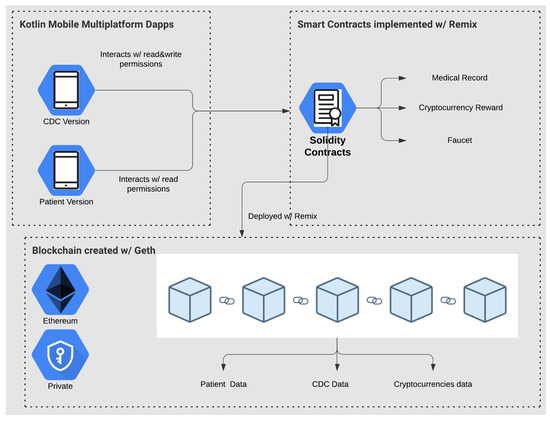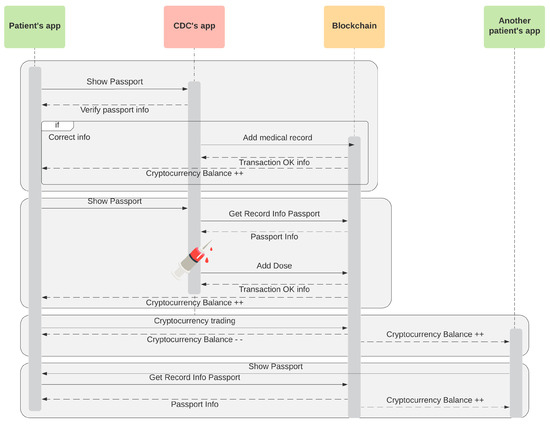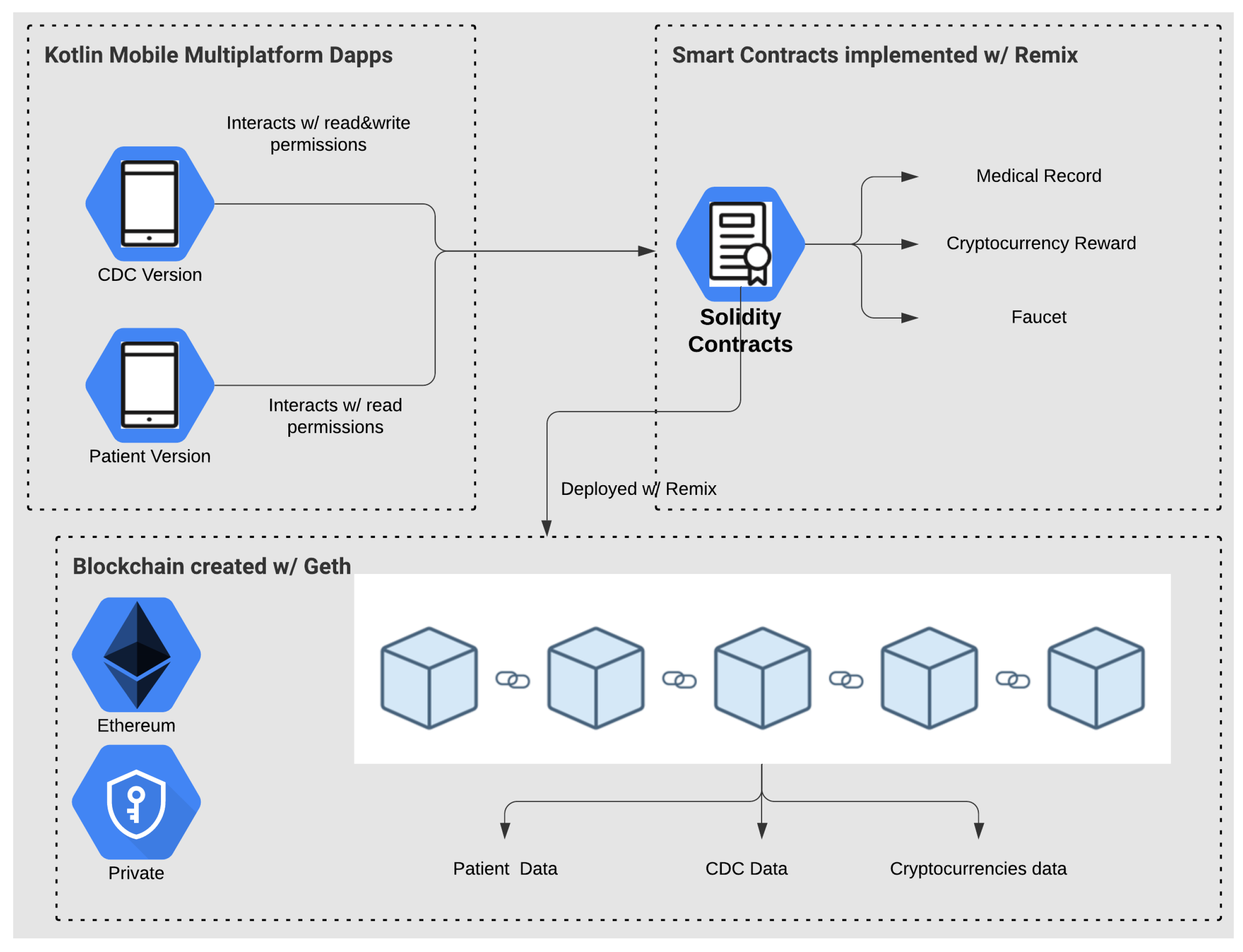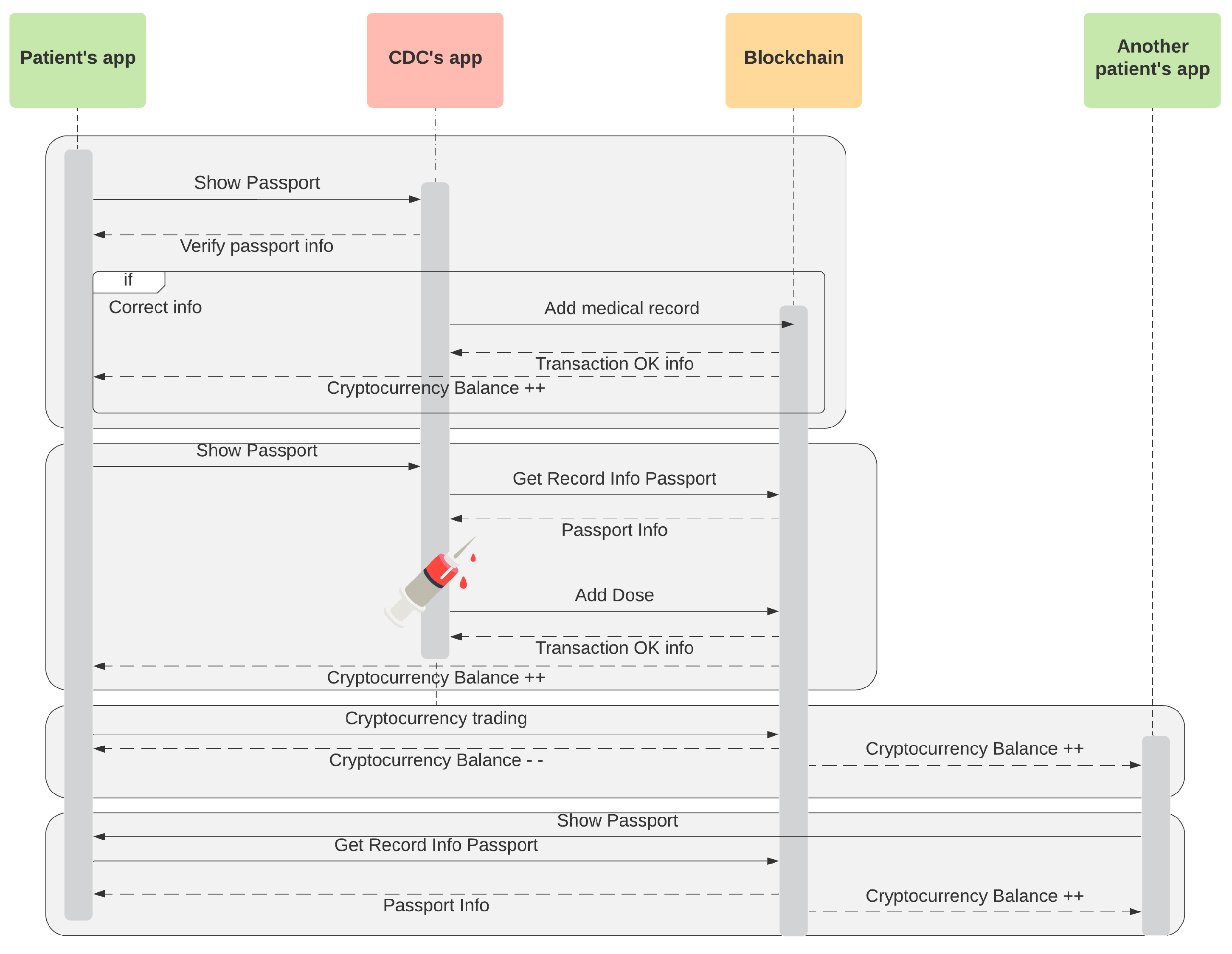Abstract
Due to the recent outbreak of the COVID-19 pandemic, everybody’s lives have changed dramatically and society went through new stages accompanied by new needs. This article details a solution for one of these needs, since it provides a system of digital certificates for the secure storage and sharing of medical data related to COVID-19, with the goal of demonstrating immunity or lack of viral infection in a unequivocal, unbreakable and secure way. The proposed system is based on Blockchain and its inherent benefits, developing also a decentralized, mobile and multiplatform app for its use and an incentive system with a customized cryptocurrency in order to reward the users who use it.
1. Introduction
Due to the global health emergency of COVID-19, declared by the WHO (World Health Organization) in 2020, a series of new stages and problems have appeared in our society that have to be faced. In particular, this paper describes a solution for one of them: the storage and use of all medical information regarding COVID-19. This solution consists of a decentralized blockchain-based secure system with automated intelligence for the storage of the most relevant COVID-19 medical information (vaccines and tests) and includes a cross-platform mobile decentralized app (Dapp) to make use of the system and a cryptocurrency to offer a way to incentivize the users who employ the system. The purpose of the project is to benefit all parties involved in its use and to improve the current pandemic situation from a public health perspective by providing a means to demonstrate immunity or lack of viral infection in order to alleviate or eliminate certain social constraints caused by the pandemic. It will also benefit health authorities by creating a compact, unbreakable and homogenous system for storing all COVID-19 information, with a high degree of scalability and potential for future exploitation. Finally, it will benefit businesses whose normal operations are affected by the pandemic (e.g., restaurants, hotels, pubs) by creating sanitary-safe environments and by providing a greater economic gain from the easing of restrictions (e.g., increased seating spots and opening hours), as well as by implementing its own commerce system that can be used as an incentive to be exploited by both parties, customers and business.
To the knowledge of the authors, the proposed solution, as described, has not been previously proposed in the literature, although similar projects are available that implement different parts of the system, such as different approaches to provide COVID-19 certificates [1], the use of blockchain-based medical information and incentives [2] or the management of private blockchains, smart contracts and cryptocurrencies [3,4].
2. Design and Implementation
Figure 1 depicts a diagram of the communications architecture of the proposed system, showing the main modules together with their components and the relationships among them. Specifically, the following modules, implemented parts and their respective technologies can be distinguished:

Figure 1.
Architecture of the proposed project.
- A private Ethereum blockchain created with Geth. The configuration of the system was performed with a JSON file that defines its Genesis Block. It was deployed along with several mining nodes that accept different types of transactions.
- Smart contracts. These were developed in Solidity with the Remix online IDE. Smart contracts implement all the functionality of the system. It is worth highlighting the following: the medical record contract, which was devised to consult the information of medical records or to write and/or to update such data; the cryptocurrency smart contract, which enables the creation of an incentive system that also allows trading; and finally, the Faucet smart contract, created to supply the demand of Ether to the different users of the system.
- Two cross-platform mobile Dapps developed with Kotlin in KMM (Kotlin Mobile Multiplatform) to modularize the project and divide the functionality on the Blockchain: reading for patients and writing for CDCs (Centers for Disease Control).
The development work is available on GitHub [5] under the Open Source license GNU GPLv3.
3. Examples of Use
Figure 2 shows an example of the flow of different interactions of the proposed system. Four use cases are illustrated sequentially: (1) A patient accesses a CDC for the first time after downloading the app, joins the system from the CDC app and his/her medical record is created and (2) updated with his new inoculation dose, receiving the corresponding incentive. Then, she/he will be able to (3) trade with the cryptocurrency to, for instance, send it to other users (e.g., in a bar, a hotel or transferring it to a friend). Finally, (4) the patient will be able to consult her/his medical information, also receiving her/his corresponding incentive and allowing access to her/his COVID-19 medical data for the user who read her/his passport.

Figure 2.
Sequence diagram that illustrates four use cases.
4. Discussion and Future Work
This paper described a digital passport system for COVID-19 consisting of two modules: one concerning blockchain and the other one related to the development of two cross-platform mobile Dapps. After the combination of both, the aim was to create a powerful system that improves and solves certain current situations of the COVID-19 pandemic, both from a technological perspective (as a new COVID-19 information storage system), as well as medical (favoring the creation of low health risk situations) and social (waiving restrictions as well as economically benefiting both customers and companies). These features can be provided thanks to the use of novel and disruptive technologies such as blockchain or KMM, which has been in alfa version since the end of 2020. In addition, the proposed system has social utility, since it provides a solution to one of the current problems that is being widely investigated worldwide. Finally, it is worth mentioning that future research lines will include the development of a native iOS app in KMM. In addition, further analysis will address how to enhance the management of network connections and how to provide advanced management features, such as granting or auditing CDC accounts, or controlling the restrictions to obtain incentives by the patients. To conclude, it must be emphasized that the dissemination, growth and improvement of the project, motivated by the Open Source nature of the product, will be key for the real and large-scale hypothetical future use of it.
Funding
This research received no external funding.
Conflicts of Interest
The authors declare no conflict of interest.
References
- European Commission. Coronavirus: Commission Proposes a Digital Green Certificate. Available online: https://ec.europa.eu/commission/presscorner/detail/en/IP_21_1181 (accessed on 31 July 2021).
- Fernández-Caramés, T.M.; Froiz-Míguez, I.; Blanco Nóvoa, O.; Fraga Lamas, P. Enabling the internet of mobile crowdsourcing health things: A mobile fog computing, Blockchain and IoT based continuous glucose monitoring system for diabetes mellitus research and care. Sensors 2019, 19, 3319. [Google Scholar] [CrossRef] [PubMed] [Green Version]
- Bitterli, F. Building a Private Ethereum Blockchain in a Box. Available online: https://wwz.unibas.ch/fileadmin/user_upload/wwz/00_Professuren/Schaer_DLTFintech/Lehre/Bitterli_2020.pdf (accessed on 31 July 2021).
- Frega, N. Ethereum-Medical-Records. Available online: https://github.com/NFhbar/Ethereum-Medical-Records/tree/master/contracts (accessed on 31 July 2021).
- COVID-19 Passport GitHub Repository. Available online: https://github.com/maurodelossantos/coronapassport.git (accessed on 8 October 2021).
Publisher’s Note: MDPI stays neutral with regard to jurisdictional claims in published maps and institutional affiliations. |
© 2021 by the authors. Licensee MDPI, Basel, Switzerland. This article is an open access article distributed under the terms and conditions of the Creative Commons Attribution (CC BY) license (https://creativecommons.org/licenses/by/4.0/).


